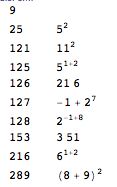Python 2.7 - 380 378 372 371 367 363 357 354 352 348 336 chars
Just a simple brute force search.
from itertools import*
s=lambda x:[x]['1'>x>'0':]+['(%s%s%s)'%f for i in range(1,len(x))for f in product(s(x[:i]),'*/-+^',s(x[i:]))]
def E(e):
try:return eval(e.replace("^","**"))
except:0
A={i:e for i in range(input(),input()+1)for x in permutations(`i`)for e in s("".join(x))[x>='1':]if E(e)==i}
print len(A)
for v in A:print v,A[v]
Example run:
1
300
9
128 (2^(8-1))
289 ((9+8)^2)
216 (6^(1+2))
121 (11^2)
153 (3*51)
25 (5^2)
125 (5^(2+1))
126 (6*21)
127 ((2^7)-1)
Explanation:
s(x)
is a function that takes a string containing a sequence of digits and returns all expressions using those digits in that order.
[x]['1'>x>'0':]
evaluates to a list containing x if x is '0' or a sequence of digits not starting with '0'; otherwise, it evaluates to an empty list. Basically this handles the case where I join all the digits together.
['(%s%s%s)'%f for i in range(1,len(x))for f in product(s(x[:i]),'*/-+^',s(x[i:]))]
basically partitions x into two parts (both being of non-zero length), calls s() on each part and joins all the results together with some operator between them, by using product().
E(e)
is basically a safe eval. It returns the value of e if e is valid and None otherwise.
A={i:e for i in range(input(),input()+1)for x in permutations(`i`)for e in s("".join(x))[x>='1':]if E(e)==i}
Basically this code tries all the numbers in the range, permutes their digits and tests each expression s() generates for that permutation, ignoring the first expression if x doesn't start with '0', because if x doesn't start with '0' then the first expression will just be x.
Alternate version - 397 chars
Here is my code if you are required to use fractions:
from fractions import*
from itertools import*
s=lambda x:["Fraction(%s)"%x]['1'>x>'0':]+['(%s%s%s)'%f for i in range(1,len(x))for f in product(s(x[:i]),'*/-+^',s(x[i:]))]
def E(e):
try:return eval(e.replace("^","**"))
except:0
A={i:e for i in range(input(),input()+1)for x in permutations(`i`)for e in s("".join(x))[x>='1':]if E(e)==i}
print len(A)
for v in A:print v,A[v].replace("Fraction","")


/works? For instance what is1/3? \$\endgroup\$-5? \$\endgroup\$